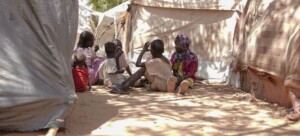Cholera still spreading in Sudan’s White Nile
Several towns and villages in White Nile state have reported new cases of cholera in the last week. Three people died in Omeiriya village.
Abdelrahman El Siddig, Head of the civil society organisations in White Nile state, told Radio Dabanga that “The El Gezira Aba Hospital hosted 16 new cholera patients on Saturday. In Asalaya, ten new cases were recorded, four in Kenana, three in El Jamousi, west of El Managil, three in El Jebelein, and one in Um Dabkir”.
He added that 17 new cases were reported in El Jebelein on Sunday.
Several towns and villages in White Nile state have reported new cases of cholera in the last week. Three people died in Omeiriya village.
Abdelrahman El Siddig, Head of the civil society organisations in White Nile state, told Radio Dabanga that “The El Gezira Aba Hospital hosted 16 new cholera patients on Saturday. In Asalaya, ten new cases were recorded, four in Kenana, three in El Jamousi, west of El Managil, three in El Jebelein, and one in Um Dabkir”.
He added that 17 new cases were reported in El Jebelein on Sunday.
The Kosti Ophthalmology Hospital received 18 to 20 cholera patients on Saturday morning. The isolation centre established at Block 54 in the western part of the town admitted more than 30 cases on Saturday, among them a number of children, journalist El Tahir El Doma informed this station on Sunday.
He said that the hospital of Rabak, the capital of White Nile state, admitted 10-12 new patients on Sunday. The doctor in charge of the cholera ward in Rabak Hospital assured him that there was a decrease in infection cases.
A volunteer from Omeiriya village, located between El Duweim and Shabasha, reported the death of three cholera patients on Sunday. He said that more than 57 villagers are infected.
He described the situation as “very serious.
“We expect a further increase in infections, while the authorities are continuing to keep silent”.
‘Watery diarrhoea cases decreased’
According to the latest report on the spread of “acute watery diarrhoea” in White Nile the state, Dr Babikir El Magboul, Director-general of the state Ministry of Health, the number of new cases decreased in Kosti and Rabak in the past days.
The report pointed to the emergence of the disease in El Giteina locality and Shabasha in El Duweim locality, while no new cases appeared in Rabak.
The Sudanese health authorities still refer to “watery diarrhoea” cases, though Sudanese medics have confirmed that the disease concerns cholera. Cholera “seems to be a stigma for the government,” a UK-based Sudanese specialist told Radio Dabanga in January. “Yet raising the awareness among communities about preventing cholera is crucial to containing a cholera outbreak.”
In April, a journalist was detained in eastern Sudan for reporting about cholera.
‘Urgent and effective interventions’
The Governor of the White Nile, Abdelhameed Kasha, reported last week that a total of 53 people died of watery diarrhoea in the state. He said that 2,755 people in 129 villages were infected. Sudan’s First Vice-President and Prime Minister, Lt. Gen. Bakri Hassan Salih, ordered the provision of “all necessary means for containing the watery diarrhoea cases in the White Nile state through urgent and effective interventions”.
Journalist El Doma told Radio Dabanga that the authorities have provided chlorine to sterilise water to reduce infections. “The infections are concentrated in areas where there is no clean drinking water and people drink directly from the river,” he said.
He further said that the White Nile state Governor Abdelhameed Kasha has ordered the transfer of all diarrhoea patients from the hospital in Kosti to the isolation centre “which has no facilities like those in the hospital”.
Abdelrahman however, told this station that the situation in the Kosti Eye Hospital is “very poor. The medical staff is short of equipment. Moreover they are not well-trained. The isolation of the patients is not done in a proper manner, and the visitors are sterilised when they leave, yet only if they ask for it.”
He said that the White Nile civil society organisations have appealed to the federal and white Nile state Ministers of Health to intervene. “Yet the government delegation that recently visited El Gezira Aba did not do much. The aids brought by the delegation were insufficient as well.”
The civil society activist expressed his concern about “the silence of the official authorities and the media concerning this humanitarian disaster” and appealed to health organisations and the international community to provide help.











 and then
and then